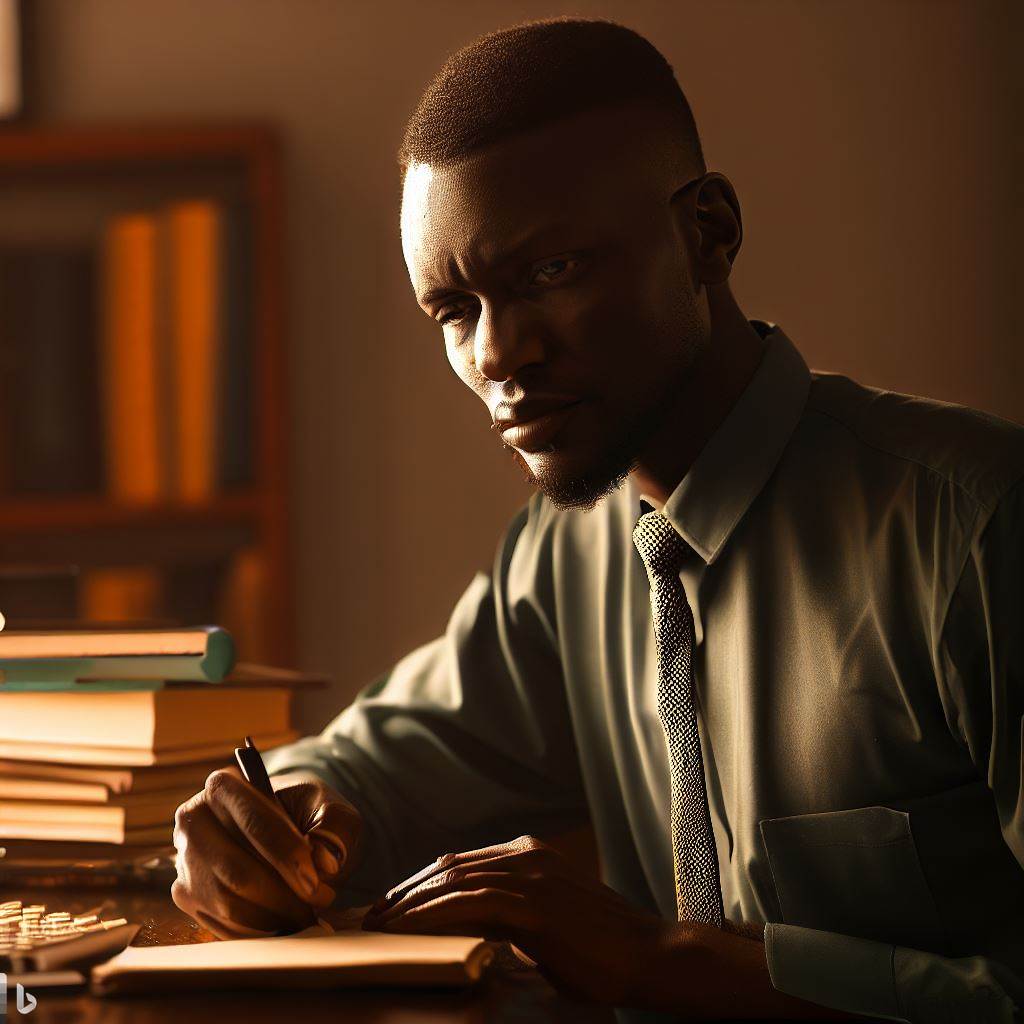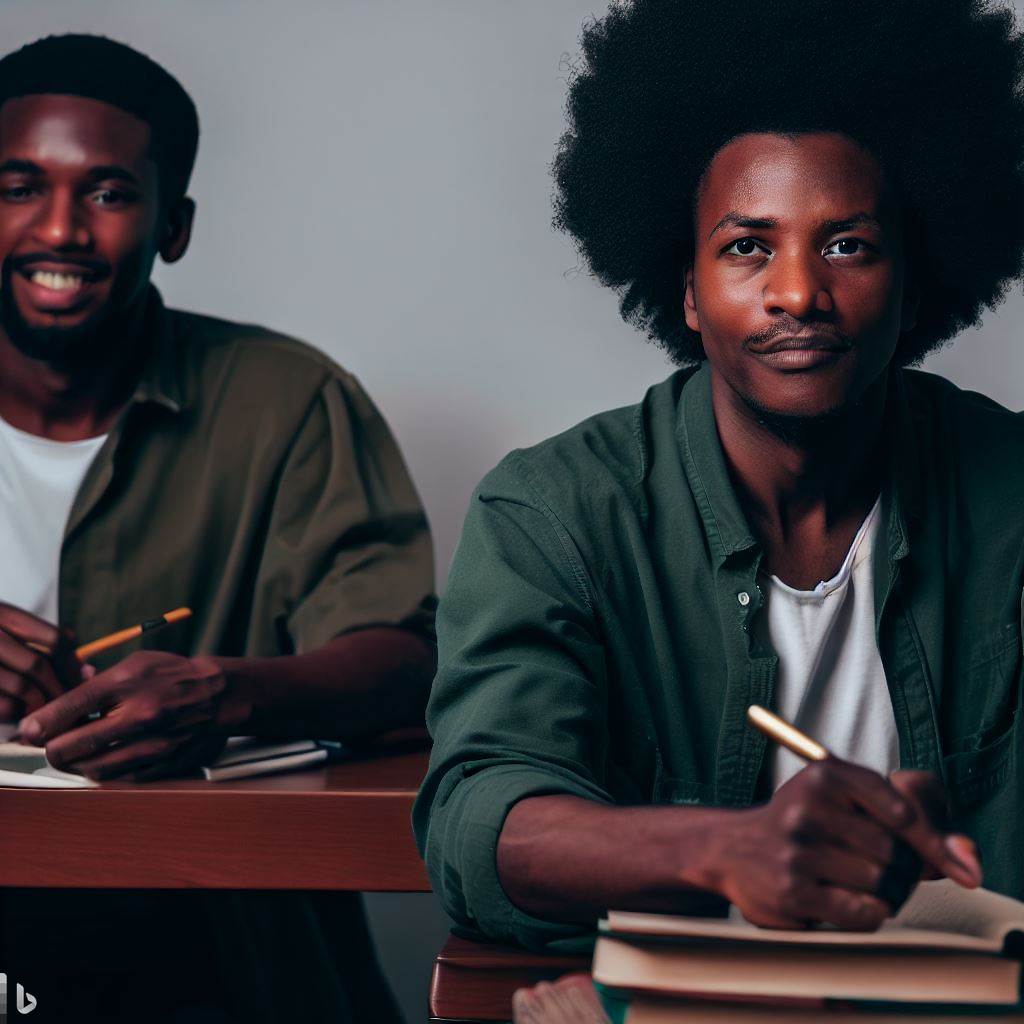Introduction
Copyright laws protect the rights of creators by giving them exclusive control over their work.
In Nigeria, understanding these laws is crucial for writers.
A. Explanation of copyright laws
Copyright laws in Nigeria regulate the use and reproduction of creative works, including literary works such as books, articles, and poems.
These laws grant authors the right to control how their work is used, copied, and distributed.
B. Importance of understanding copyright laws for writers in Nigeria
- Protecting intellectual property: Copyright laws safeguard the originality and ownership of a writer’s work, preventing others from using it without permission or proper recognition.
- Financial benefits: Understanding copyright laws allows writers to monetize their work by licensing or selling it, ensuring they receive fair compensation for their efforts.
- Reputation management: Copyright laws enable writers to maintain control over the integrity of their work, ensuring that it is not distorted, misrepresented, or used in a way that can damage their reputation.
- Legal protection: By understanding copyright laws, writers can take legal action against those who infringe on their rights, seeking remedies such as injunctions, damages, or even imprisonment for offenders.
- Collaboration opportunities: Understanding copyright laws opens doors for writers to collaborate with other artists, publishers, or organizations, fostering creative partnerships and expanding their reach.
As writers in Nigeria, it is vital to have a clear understanding of copyright laws.
By doing so, we can protect our intellectual property, secure financial benefits, maintain our reputation, and avail ourselves of various opportunities for creative collaborations.
What is Copyright?
A. Definition and purpose of copyright
Copyright is a legal right that grants authors and creators exclusive control over their original works.
It allows them to reproduce, distribute, and display their work, and to grant permission to others.
The purpose of copyright is to protect the rights of creators and encourage creativity.
It ensures that creators can profit from their work and have control over its use.
B. Brief history of copyright laws in Nigeria
Copyright laws in Nigeria trace their roots back to the colonial era. The first copyright law was introduced in 1911 as part of the Copyright Ordinance.
Over the years, the laws have undergone several amendments to keep up with technological advancements. The current copyright law in Nigeria is the Copyright Act, enacted in 1988.
C. Overview of international copyright conventions and treaties
Nigeria is a member of several international copyright conventions and treaties. One of the most important is the Berne Convention for the Protection of Literary and Artistic Works.
The Berne Convention sets minimum standards for copyright protection among its member countries.
Nigeria is also a member of the World Intellectual Property Organization (WIPO) and the WIPO Copyright Treaty.
These international agreements ensure that Nigerian creators’ works are protected globally and vice versa. They provide a framework for international cooperation and exchange of intellectual property rights.
In the end, copyright is a fundamental right that protects the works of authors and creators in Nigeria and around the world.
It allows them to control the use of their works and ensures they can profit from their creativity.
Nigeria has a long history of copyright laws, starting from the colonial era.
The current copyright law, enacted in 1988, provides the legal framework for protection.
Nigeria is also a member of international conventions and treaties, such as the Berne Convention and WIPO, which promote global cooperation in copyright protection.
These laws and agreements are crucial for safeguarding intellectual property rights and fostering a vibrant creative industry.
Read: Women in Writing: Profiling Nigerian Female Authors
Understanding Nigerian Copyright Act
A. Explanation of the Nigerian Copyright Act
The Nigerian Copyright Act is a legal framework that protects the rights of creators and authors in Nigeria.
It provides a set of rules and regulations that govern intellectual property rights.
Under this Act, copyright is granted to original literary, artistic, musical, and dramatic works. It covers a wide range of creative works, including novels, poems, plays, songs, and computer programs.
The Act defines what constitutes infringement and provides remedies for copyright holders whose rights have been violated.
B. Key provisions of the Act relevant to writers
- Protection of literary works: The Act extends protection to literary works, including novels, poems, and essays. Writers have exclusive rights to reproduce, distribute, and publicly display their works.
- Duration of copyright: In Nigeria, the duration of copyright protection for literary works is the lifetime of the author plus 70 years after their death. This ensures that writers’ works are protected for a considerable time.
- Exclusive rights of copyright owners: Writers have exclusive rights to control the reproduction, distribution, and performance of their works. No one can use their works without obtaining permission or a license from the author.
- Limitations and exceptions to copyright: The Act allows for certain limitations and exceptions to the rights of writers. For instance, fair use allows others to use copyrighted material for educational or research purposes.
In fact, the Nigerian Copyright Act provides a strong legal framework for protecting the rights of writers. It grants exclusive rights to authors and ensures that their works are protected for a significant period.
The Act also allows for certain limitations and exceptions, balancing the interests of both creators and users of creative works.
Read: The Role of Cruise Ship Entertainers in Nigeria
Copyright Infringement
Copyright infringement refers to the unauthorized use of copyrighted material without the owner’s permission.
Types of acts that constitute copyright infringement
- Reproduction and distribution: Copying or reproducing literary, artistic, or musical work without authorization. Distributing copies of the copyrighted work to the public without permission.
- Public performance and display: Publicly performing or showing a copyrighted work without obtaining the necessary rights. Displaying the work for the public to see, such as in a gallery or on a website, without permission.
- Derivative works: Creating new works based on or using substantial parts of a copyrighted work without authorization. Modifying, adapting, or transforming an existing work into a different form without permission.
Consequences of copyright infringement in Nigeria
- Civil remedies: The copyright owner can initiate a lawsuit to claim damages and seek injunctions against the infringer.
- Criminal penalties: In severe cases, copyright infringement can result in criminal charges, fines, or imprisonment.
- Seizure and destruction: The court may order the seizure and destruction of infringing copies of the work.
- Loss of reputation: Copyright infringement can tarnish the reputation of the infringer and damage their professional standing.
- Loss of income: Infringement may result in financial losses for the original creator, impacting their potential earnings.
In short, copyright infringement in Nigeria involves the unauthorized use, reproduction, distribution, public performance, display, or creation of derivative works without the copyright owner’s permission.
The consequences can range from legal action and financial penalties to reputational damage and loss of income.
It is crucial for writers and content creators to understand copyright laws to protect their intellectual property rights.
Read: How to Become a Cruise Ship Entertainer in Nigeria

Protecting your Copyright as a Writer
A writer’s biggest asset is their originality and creativity, and protecting their copyright is of utmost importance.
Here are some key aspects to consider:
A. Originality and creativity
- Ensure your work is original and not a copy of someone else’s.
- Express your ideas and thoughts in a creative and unique manner.
- Avoid using content that is already in the public domain or considered fair use.
B. Copyright registration process in Nigeria
- Understand the copyright laws and registration process in Nigeria.
- Consult with legal experts or copyright offices to ensure a smooth registration process.
- Pay the necessary fees and fill out the required forms accurately.
- Submit your work along with all required supporting documents.
C. Importance of marking your copyrighted works
- Mark your works with the copyright symbol (©), your name, and the year of creation.
- This serves as a notice to others that your work is protected by copyright.
- It helps to prevent unauthorized use and acts as evidence of your ownership.
D. Understanding fair use and public domain
- Be aware of the concept of fair use, which allows limited use of copyrighted material without permission.
- Familiarize yourself with the criteria for fair use, such as purpose, nature, amount, and effect on the market.
- Know which works are in the public domain and can be freely used by anyone.
- Public domain works are not protected by copyright or their protection has expired.
By following these guidelines and understanding the relevant laws, you can better protect your copyright as a writer in Nigeria.
Remember, originality and creativity are your greatest strengths, so make sure to safeguard them!
Read: Writing for Social Change: The Nigerian Experience
Learn More: Celebrating Nigeria’s Foley Artists: Unsung Heroes of Sound
Navigating Copyright Issues in the Digital Age
A. Challenges posed by the internet and digital content
- The internet has revolutionized the way information and creative works are shared.
- However, it has also brought about numerous challenges regarding copyright protection.
- The ease of copying and distributing digital content has led to widespread infringement.
- Writers in Nigeria now face the dilemma of protecting their work in the digital landscape.
- The global nature of the internet makes it difficult to enforce copyright laws effectively.
B. Digital rights management and anti-piracy measures
- Digital rights management (DRM) technologies aim to control the use and distribution of digital works.
- DRM systems use encryption and access controls to prevent unauthorized copying and sharing.
- However, DRM is not foolproof and can sometimes restrict legitimate uses of copyrighted material.
- Anti-piracy measures, such as watermarking and fingerprinting, help track and identify infringing content.
- Collaboration between content creators, internet service providers, and technology companies is crucial in combating piracy.
C. Intellectual property infringement online and legal recourse
- Intellectual property infringement is a serious concern in the online environment.
- Plagiarism, unauthorized distribution, and illegal downloads continue to threaten the rights of writers.
- In Nigeria, writers can seek legal recourse by registering their works with the Nigerian Copyright Commission.
- Registration provides prima facie evidence of ownership, making it easier to prove infringement in court.
- Legal actions can result in injunctions, damages, and even criminal charges for copyright violators.
As writers navigate the digital age, understanding and finding solutions to copyright challenges becomes paramount.
While the internet presents obstacles with its vastness and ease of copying, digital rights management and anti-piracy measures can provide some level of protection.
Combating intellectual property infringement requires collective efforts from content creators, internet service providers, and technology companies.
Writers in Nigeria can take legal recourse by registering their works with the Nigerian Copyright Commission, ensuring stronger legal protection.
Overall, staying informed and proactive in safeguarding copyright is essential for writers to protect their creative endeavors in the digital landscape.
Conclusion
A. Recap of the importance of understanding copyright laws
Understanding copyright laws is crucial for writers in Nigeria to protect their intellectual property.
By having a clear understanding of these laws, writers can safeguard their works from unauthorized use.
Nigerian writers must familiarize themselves with the legal framework that governs their creative endeavors.
Copyright laws grant writers exclusive rights to their works, preventing others from copying or distributing them without permission.
Writers must also be aware of the duration of copyright protection, as well as the procedure for registering their works.
B. Final thoughts and encouragement for writers to protect their works
Nigerian writers should prioritize understanding copyright laws as a means to protect their creative outputs.
By taking proactive steps to secure their rights, writers can preserve their artistic integrity and financial interests.
It is essential for writers to be vigilant in monitoring and enforcing their copyrights, as infringement can have serious consequences.
Seeking legal advice or joining professional organizations can provide writers with further guidance and support.
Ultimately, by valuing their own work and arming themselves with knowledge, Nigerian writers can thrive in a protected creative environment.
Let us encourage all writers in Nigeria to empower themselves with the understanding and application of copyright laws.
Together, we can foster a culture of respect for intellectual property and ensure the continued growth of the writing industry.




